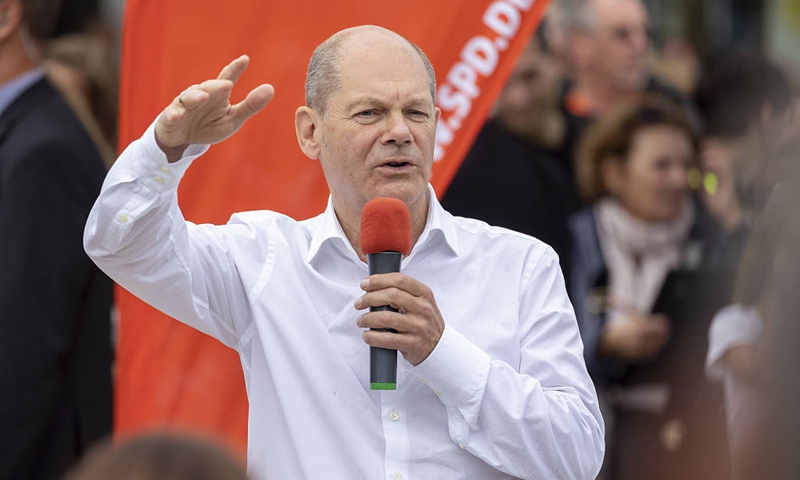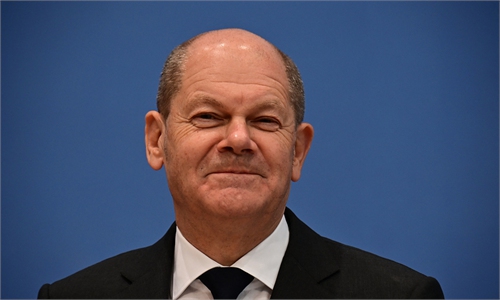
German Chancellor Olaf Scholz Photo: CFP
Olaf Scholz, who has served as German Chancellor for a year, stressed his opposition against “decoupling from China” and reiterated German government’s adherence to the one-China principle in a recent interview with Sueddeutsche Zeitung, which was interpreted by Chinese experts as a signal of goodwill towards China ahead of the coming new year.
Chinese experts believe the German leader’s remarks about China are rational and pragmatic, that is, Scholz has been telling the outside world that problems and differences can be negotiated and discussed, and China cannot be simply defined as an opponent or an enemy.
“I do not really agree with the idea of decoupling internationally,” Scholz said in response to a question about the desire for more independence from China. De-globalization and the voluntary restriction to a few trading partners are not a good recipe for the future of the world, he noted.
This is not the first time Scholz has expressed similar views. China’s rise is neither a reason to isolate China nor an excuse to limit cooperation with China, Scholz said in an editorial published recently on the website of US international relations magazine Foreign Affairs, adding that he does not agree with the idea that the world is entering a new Cold War between China and the US.
China is a growing force for world peace and provides opportunities for global development, Chinese Foreign Ministry spokesperson Mao Ning said on December 6 in response to Scholz’s remarks, sadding that isolating China and restricting cooperation with China serve no one’s interests.
China is deeply integrated with the global economy and international system, and the world will not retreat to a state of mutual closure and separation. Any move toward decoupling and bloc confrontation will harm others without benefiting oneself, Mao added.
In early November, Scholz paid a short but meaningful visit to Beijing, agreeing on enhanced dialogue and cooperation and rejecting decoupling and bloc confrontation. As the first European leader to visit China after the 20th Communist Party of China National Congress and the first G7 leader to visit the country since the outbreak of COVID-19, Scholz has faced mounting pressure from some German and European politicians, and in particular from Washington.
Germany's national interests are diversified, and the German government has a clear attitude that it cannot bet its future on only one or a small handful of countries, Sun Keqin, a research fellow at the China Institutes of Contemporary International Relations, told the Global Times.
The Russia-Ukraine conflict has caused obvious and long-term damage to Germany, while the economic and trade cooperation between China and Germany can continue to inject momentum into the German economy. Germans are clearly aware that globalization and diversification are the fundamental guarantee for the vitality of their economy, Sun noted.
The year 2022 marks the 50th anniversary of the founding of China-Germany diplomatic relations. The sound development of bilateral relations in the past has been a good example of seeking common ground while shelving differences and pursuing win-win cooperation, analysts said.
An important reason that Germany cannot easily decouple from China is that Germany plays a pivotal role in global governance and bilateral relations, and decoupling from China is not in the fundamental interests of Germany, Sun explained.
Many Chinese experts who have observed China-EU relations for a long time said there is great potential for China and Europe to develop bilateral relations and negotiate and manage global issues. Despite differences in values and social systems, the China-EU cooperation can still be maximized by managing and resolving differences and conflicts step by step.
At the same time, experts expressed their appreciation and welcoming of the rational views on China held by many European leaders, including Scholz, and said that it is very important for European leaders not to misjudge the opportunities created by China's rise.

